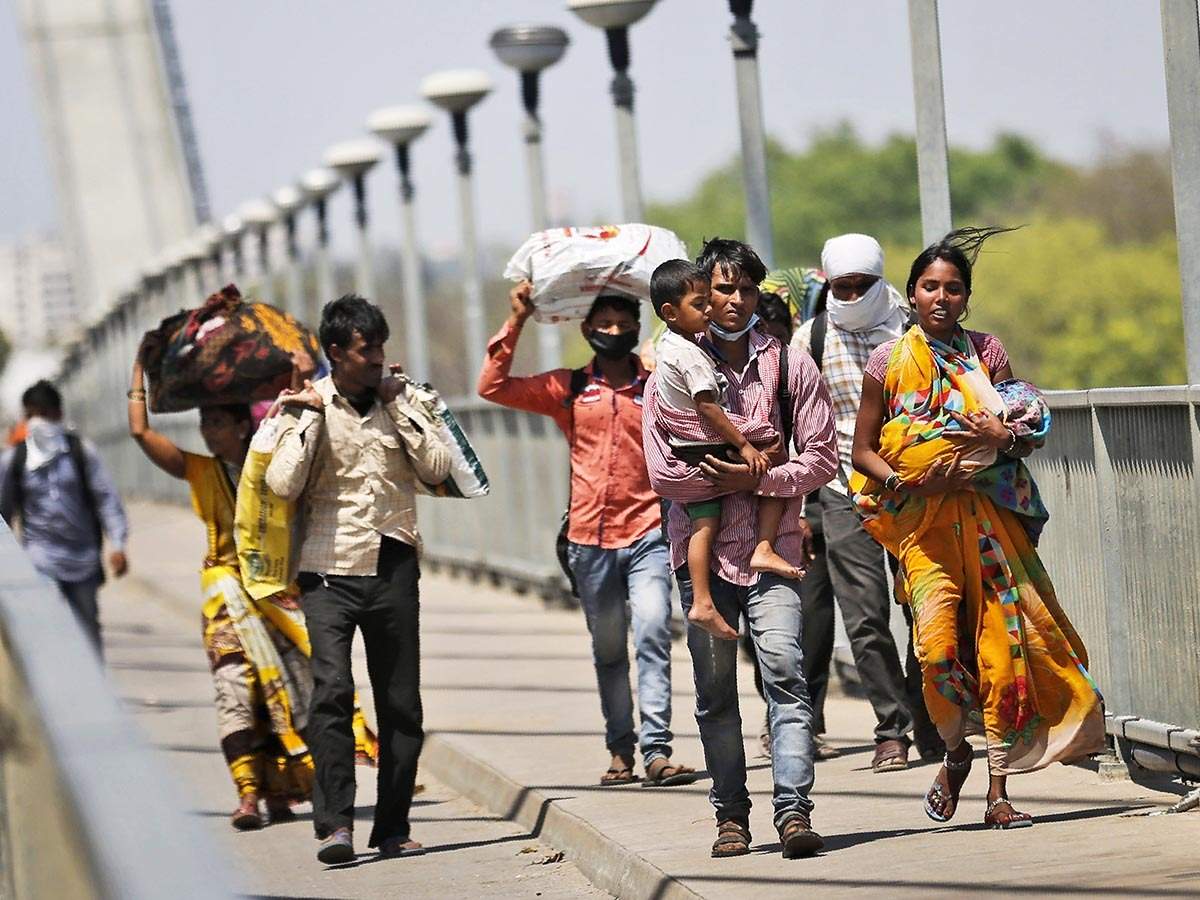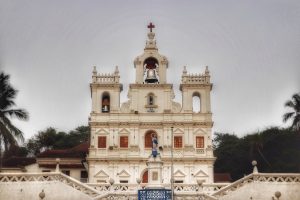A.THE BEGINING OF THE CRISIS
March 25 is historic across India in 2020. This was the month that had spread the news about the pandemic in India followed by lockdown which has affected the entire world but its impact on daily wagers, small businesses, employees is tremendous. The economic impact of the lockdown became more visible when the trail of the migrant labours walking long distances on road for their home caught media attention.
The announcement of a nationwide lockdown triggered a massive mass departure of migrant labours from industrial towns back to their home state either on foot or on a bicycle. Deprivation of basic living and state of uncertainty of situation caused these migrant labours to began their taxing journey back home. The situation also gives rise to a big question whether such a huge issue was within the perception of the system before announcing the lockdown measure. How belated or timely were the rescue and its impact on COVID spreads needs introspection?
Uttar Pradesh, Bihar, Madhya Pradesh, Rajasthan, Uttarakhand, Jharkhand, West Bengal and Odisha had major returnees. The major host states of Maharashtra, Karnataka, Tamil Nadu, Gujarat, Andhra Pradesh, Telangana, Delhi and Kerala were trying to minimise the loss of labour and skill.
SUO MOTO PETITION ON MIGRANT LABOUR BEFORE SUPREME COURT
The matter in suo moto writ petition (Civil) No.(s) 6/2020 was heard by the Judges with Coram HON’BLE MR. JUSTICE ASHOK BHUSHAN, HON’BLE MR. JUSTICE SANJAY KISHAN KAUL AND HON’BLE MR. JUSTICE M.R. SHAH.

B. TIMELINE OF EVENTS SUBMITTED BEFORE COURT
25.03.2020: National lockdown was declared.
29.04.2020: A month later, the decision was taken on by Government of India, Ministry of Home Affairs, allowing movement of migrant workers, pilgrims, students and other persons, who were stranded at different places.
01.05.2020: New guidelines for the movement was issued by the Government of India, Ministry of Home Affairs.
02.05.2020: Ministry of Railways issued an order announcing running of special Shramik trains to take the migrant labourers to their destination. It was stated in the affidavit that nearly 80% of the trains are bound for Uttar Pradesh and Bihar and balance trains headed towards Eastern India.
C. STATUS REPORT OF STATES SUBMITTED BEFORE COURT
NCT of Delhi: About 3 lakhs migrant workers have been sent to their native places by 236 trains and about 12,000 have been sent by buses. About 6.5 lakh persons have already registered themselves at the web portal of the Government of NCT of Delhi. SMS and IVRs have been sent to these registered persons for their travel back to their native place. About 2 lakhs migrant labourers have chosen to not to go to their native places, presumably due to the fact that after the opening of the industry and establishment they have re-engaged them to the work.
Gujarat: 999 Shramik trains. From May 24, 2020, no train fares for Shramik trains are being charged from the migrant workers. In Gujarat, there were approximately 23 lakhs migrant workers, who were working at different places. Approximately 5,75,000 workers have been sent by road transport to other States. The Senior Counsel submitted that out of 23 lakhs about 20,50,000 have already been sent. No bus fare has been charged from inter-state migrant workers. For registration, an online portal “Digital Gujarat” has been set up by the Government and also a parallel, effective, decentralized system has also been worked out.
Uttar Pradesh: About 25 lakh workers have successfully and safely returned to their homes in the State. Shelter homes for migrant labourers have been set up. Uttar Pradesh State Road Transport Corporation by its buses ensuring that all migrant labourers reach their homes safely and free of cost. The migrant labourers are sent for home quarantine for 15 days and while leaving centre he is provided one ration kit as well as a cash amount of Rs.1000/-.
Bihar: It is submitted that about 28 lakh migrants have returned to the State of Bihar. The migrants have returned both by train as well as by road transport. The State has set up camps. The State is in the process of setting up District Counselling Centre for migrant labourers, who shall examine the skill level of the skilled/unskilled labourers and suggest the options of employment available in the State. The State has also provided Rs.1000/- to each migrant of Bihar stranded outside the State.
Maharastra: The State of Maharashtra submits that about 12 lakhs migrant labourers have been sent to their native places. More than 5 lakhs passengers have been ferried free of cost by buses of Maharashtra Road Transport Corporation. On a query by the Court, as to how many stranded migrant labourers are still in the State of Maharashtra, Shri Chitnis, the learned counsel for State submits that about 37,000 are still waiting to return. He submits that the State of Maharashtra has requested for only one train to the railways. He further submits that registrations of migrant workers are being done and a list of migrant labourers have been prepared by the State and most of the labourers have been shifted to relief shelters where they are waiting for their turn to board the buses and trains.
Madhya Pradesh: About 14 lakh migrant labourers have returned to the State and there are only 25,000 workers, who remained to come back in the State of Madhya Pradesh. Government has deployed buses to bring migrant labourers from other States. The State proposed to undertake a survey of migrant labourers and the labourers will be registered under different schemes to provide possible employment to them. A control room has been established for helping migrant labourers.
Kerela: 1.53 lakh workers have been transferred to 100 Shramik trains. There are 1.2 lakh workers still waiting for a return.
West Bengal: Learned counsel submitted that 6,82,558 workers are still to come to West Bengal, who are in different States. For travel by special trains, the entire cost, on behalf of the migrants, is being borne by the State of West Bengal.
K.V. Vishwanathan, learned senior counsel, has referred to NLS-Migrant Mazdoor Program. Under which 180 migrants were airlifted from Mumbai to Jharkhand. He submits that NLS-Migrant Mazdoor Program is an initiative by few alumni of the National Law School of India University, Bengaluru.
Ministry of Railways: It had issued letters dated May 29, 2020, and June 3, 2020, to Chief Secretaries of all the States and Union Territories on the subject “projected demand for movement of stranded persons by Shramik rail”. Shri Tushar Mehta has also submitted that in view of the fact that since several States were not giving consent for accepting Shramik special train, despite demand, Ministry of Home Affairs issued an order on 19.05.2020 removing the need for consent.
The Railway Ministry has made it clear that any demand for Shramik special train shall be met within 24 hours by the Railway Ministry and total demand, which is now pending is only 171 trains whereas Ministry has earlier run 250 trains in one day. Shri Tushar Mehta submits that for the train travel no fare is being asked from the migrant labourers and the same is borne as per arrangement between originating State and receiving State. He submits that in train journey food and water is provided by the originating State and in the journey for a period of more than 12 hours one meal is also provided by railways.
On-road transport: Solicitor General has informed the court that about 41 lakh migrant workers have been taken from their respective places to their desired destination through road transport.
Food distribution: Shri Tushar Mehta also submitted that under various Central Government schemes like Antyodaya Anna Yojana food grains have been provided for every household. He submits that under Pradhan Mantri Garib Kalyan Anna Yojana @ 5 kg per person per month for a period of three months (April-June, 2020) is distributed free of cost.
D. PRESENT LAWS
As part of reforming labour law, a Bill has been introduced in Parliament called the Occupational Safety, Health and Working Conditions Code of 2019. The proposed code seeks to merge 13 labour laws into a single piece of legislation. The Inter-State Migrant Workmen (Regulation of Employment and Conditions of Service) Act of 1979, is one of them. But activists fear that specific safeguards given to migrant workers may be lost as a result of this consolidation.
E. OTHER COURT PROCEEDINGS ON MIGRANT LABOUR
(i). Proceedings before Bombay High Court
The division bench of Chief Justice Dipankar Datta and Justice KK Tated has asked the state to elaborate on the procedure that a migrant worker is required to follow to be eligible to leave Maharashtra. The bench has also asked the state to specify the waiting period of the migrant labourers to board a train or bus, the nature of shelter being made available to them and the details of provisions made available for their sustenance.
(ii) Earlier petition by Adv. Alakh Srivastava in Supreme Court of India
The Supreme Court bench comprising of Justice S.K. Kaul, B.R. Gavai and Nageshwar Rao said earlier on the issue it is impossible for courts to monitor or stop the movement of the migrant worker across the country and it is for government to take necessary action. The application was filed by Alakh Alok to seek direction to identify stranded labours, provide shelter and food to them and provide them for transportation. This plea was filed post-Aurangabad incident where labours were mowed down by train.
(iii) Andhra Pradesh High Court
On the nature of writ of mandamus, in the form of Public Interest Litigation (PIL) declaring the action of the Respondents herein in not allowing the Migrant Workers settled in Vijayawada and Guntur Districts in particular and in the other parts of the State of Andhra Pradesh in general, who belongs to various parts of the State of Andhra Pradesh and also from other States, to return to their hometowns and Villages after conducting necessary testing for COVID–19 and to arrange for their safe travel by providing necessary transportation to this effect and not providing food and accommodation facilities to them, as illegal, arbitrary and violative of their fundamental rights guaranteed under Articles 14, 19 and 21 of the Constitution of India and consequently direct the Respondents herein to provide necessary food material and also give some immediate financial assistance to the Migrant Workers and also permit them to return to their hometowns and Villages after conducting necessary testing for COVID-19 and to arrange for their safe travel by providing necessary transportation to this effect, forthwith. The following orders were passed:
(a) In four Districts viz., Krishna, Guntur, Srikakulam and Chittoor, on the roadside nearby the Toll Plazas or some other appropriate place at the highway, a temporary camp be established to provide shelter to the migrant workers, offering drinking water and other adequate facilities. The same facilities shall also be made available in other Districts.
(b) A coordination team be appointed including Red Cross Workers, Social Workers or Voluntary Organisations, Para Legal Volunteers, Village Volunteers and an employee each from the Departments of Revenue, Police, Health and local Administration. The said team shall ascertain the whereabouts of such migrant workers and make them ready for adequate facilities providing food to them.
(c) Within eight hours, their registration may be made for their shifting to the places where they intend to go with the assistance of the Software Company, namely ACRUX IT SERVICES PVT. LTD. to provide assistance, particularly, in Guntur and Krishna Districts by their team and, if possible, in two other districts.
(d) Otherwise, the Government shall make arrangement of data entry operators’ team with a computer system for the registration of the migrant workers in all the Districts. The said team must work at least in two shifts of eight hours each, i.e., at least sixteen hours a day, thereby the entries may be recorded immediately or as early as possible, and register them for transportation state-wise.
(e) As per the entries so made, arrangement by way of Government buses, private buses for the shifting of workers may be made by the State Government. While making such an arrangement, technicalities with private buses may be ignored for this purpose with an aim and object as to how far immediate steps may be taken for shifting the workers to their destination.
(f) The higher officials of the State of Andhra Pradesh and the State where those workers are required to be shifted shall coordinate with each other and shift those workers, making requisite facilities of quarantine or otherwise, but for this reason, there should not be any hurdle in shifting of those workers.
(g) The Principal Secretary and the Commissioner, Transport Department shall take up this responsibility in coordination with the officers at every District level. The District Collector shall supervise the things by appointing a team consisting of Joint Collector, Revenue Divisional Officer and Tahsildar, who shall visit the camps every day and remain there at least for one hour to understand their problem.
(h) It is further directed that the Secretary, District Legal Services Authority of every District shall also visit those camps an hour a day and shall coordinate with the Government officials that include Joint Collector, Revenue Divisional Officer, Tahasildar and the officials of Transport and other Departments to make things available to those migrant workers, that includes water, food and other necessities; thereby, those workers may be shifted to their destination.
The aforesaid directions would apply in the matter of shifting of these migrant workers by Government buses, private buses and Railways. In case of an arrangement by buses, is to be made, it shall be made within 48 hours, while in case of arrangements by trains; the same must be made within 96 hours.
(iv) Allahabad High Court
The petition filed by two advocates of the court is concerning the welfare of the migrant labourers. The Allahabad High Court, while issuing notice to the state government has asked the government what measures it plans to take for the rehabilitation of the labourers who have returned to the state and its plan to reduce migration to other states.
(v) Madras High Court
Writ petition has been filed under Article 226 of the Constitution of India praying for the issuance of Writ of Mandamus directing the respondents to identify all the inter-state migrant workers stranded in the whole of Kancheepuram, Chengalpet Thiruvallur and Ranipet districts and to provide all the legal entitlement promised by the Government of Tamil Nadu under COVID 19 in relation to pending salary payments fro the past months till April 2020, dry rations and rent-free accommodations for all inter-state migrant workers located in Kancheepuram District under the direct supervision of the Chairman of the District Legal Services Authority, Kancheepuram District.
E. ORDER IN SUO MOTO PETITION OF SUPREME COURT
The following are the interim directions until the pending considerations of the State and Central Governments:
- The fare of the bus or the train shall not be charged from the workers either by railways or by States and shall be paid by the States as per their arrangements.
- The migrant workers who are stranded at different places shall be provided with food free of cost at different places which shall be notified to them during their waiting period to board the train or bus.
- The originating State shall provide the workers with the water and food and even during the journey, the railways should provide with the water and food and same as to in the case of workers travelling through the bus.
- The State shall speed up and simplify the process of the registration and provide with the help desks for registration at the places where the workers are stranded.
- After the registration, the workers should be asked to board the train or bus at the earliest and publicize the information regarding the mode of transport.
- All the migrants seen walking on the highways should be taken care of by the State/Union Territories and shall be provided with the transportation facility to the destination including food and water.
- After migrants reaching the native place, the receiving State shall provide with the transport along with health screening and basic facilities free of cost.
The court also observed:
-
- For identifying the migrant workers in different States, the protocol of registration is already invoked. We are further of the view as already directed vide order dated 28.05.2020 that the process of registration is simplified.
- Identification of migrant workers is immediately completed by all the States/Union Territories. Those migrant workers, who are not yet registered, immediate steps are taken by decentralising the process of registration by providing the facility of registration to the migrant workers at nearby places including police stations and other places of local administration as may be notified.
- The information regarding the journey by train and bus, which is to be undertaken by stranded workers should be publicised through local newspapers, local T.V. channels so that necessary information reaches to concerned migrant workers.
As noted above, the majority of stranded workers have reached their native places. The second major task which has now to be undertaken by the concerned States and Union Territories is of taking care of those migrant workers/labourers who have returned to their native places after cessation of their employment.
- The first step in this regard is to maintain a record of all such migrant workers, who have arrived at different places, towns in different States. The details of migrant workers, nature of their skill, place of their earlier employment be maintained in prescribed proforma to be formulated by the concerned State at the village level, block level and the district level so that necessary help can be extended by the State authorities and district authorities to these migrant labourers.
- Various counsel appearing for the States and other counsel has also submitted that some of the migrant labourers, who got themselves registered to return to their native place have changed their mind and after reopening of the industries and factories they have re-joined employment and are not willing to return. The State may also provide the necessary information and facilitate the return of the workers who want to return to their employment. Necessary information should be provided by the State in this regard by creating help desk with the help of railway authorities and road transport authorities.
- Counselling centres be set up by the concerned State at the block level and the district level to provide all information regarding Government schemes and other avenues of employment to these workers and where possible to expand the avenues of employment to these workers so that they may not sit idle and they may be utilised as a resource by the State.
Apart from schemes, which are run by the Central Government for the benefit of people in the country, each State has also its own schemes taking care of different aspects including providing avenues for employment. Migrant labourers and other needy persons should be made aware of all schemes through counselling centres and help desk which may be established by the States at district levels and block levels to extend helping hand to a large number of migrant workers.
Maharastra: The apex court is of the view that State has to take a more vigilant and concentrated effort in identifying the migrant workers, who are still stranded in the State of Maharashtra and who are willing to return to their native places. The Government should publicise and announce the places i.e police stations or any other suitable place for identifying/registering the workers, who have not yet been provided with any train or bus journey. The State Supervisory Committee, District Supervisory Committee and its officials should ensure that all migrant labourers, who are willing to go to their native place, should be identified, provide them food and shelter and no complaint is received of not providing the facility of journey or food by the stranded migrant labourers.
The matter is listed on July 8, 2020 for further hearing
AUTHOR: The article is based on research work of Shubham Sengar, Intern of Indian Law Watch, Pursuing BA LL.B Student Correspondent, Gautam Budhha University, Greater Noida.













Add Comment